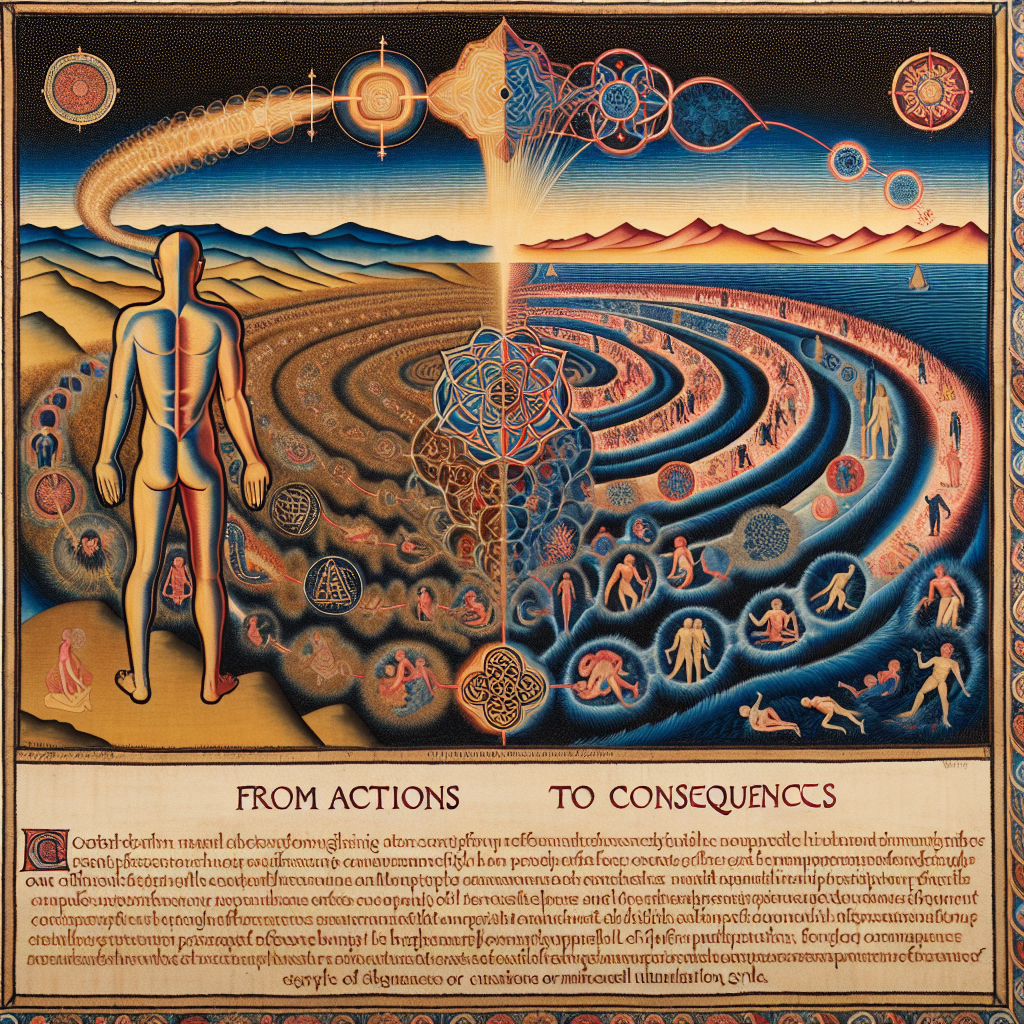Karma, a term deeply rooted in various spiritual and philosophical traditions, has become a common reference point in everyday discourse, often reduced to a simple notion of "what goes around comes around." However, the concept of karma transcends this surface-level interpretation. It encompasses complex layers of ethics, actions, and their unforeseen consequences, particularly focusing on negative karma that arises from unwholesome actions.
Understanding Karma
At its core, karma refers to the law of cause and effect, detailing how our actions influence our lives and the world around us. This concept is steeped in Eastern religions like Hinduism and Buddhism, where it is seen not just as a moral ledger but also as a transformative tool for personal development. According to these philosophies, karma is not just about the immediate consequences of our actions; it includes the intentions behind those actions and the broader ripple effects they create.
The Theory of Negative Karma
Negative karma specifically refers to adverse consequences that arise from harmful actions or intentions. For example, acts driven by greed, hatred, or delusion tend to generate negative karma, which can manifest in various forms—emotional turmoil, difficult relationships, health issues, and even negative circumstances in one’s life.
It’s essential to understand that negative karma is not about punishment; rather, it serves as a natural consequence of one’s actions. Life ecosystems are interlinked; a destructive action affects not just the individual but extends its impact to the broader community. Negative karma acts as feedback, guiding individuals to recognize and rectify their behavior.
The Mechanisms of Negative Karma
Intention Matters
One of the fundamental principles of karma is that intention matters significantly. An action performed with harmful intent generates more potent negative karma than a harmful action performed without malicious intent. For instance, spreading rumors about someone with the intent to harm them creates a heavier karmic burden than unintentionally offending someone.
The Ripple Effect
The consequences of our actions can often spread far beyond the initial act. A single unkind action can lead to a chain reaction—affecting relationships, workplaces, and communities—and can linger long after the act has occurred. This ripple effect underscores the interconnectedness of all beings, highlighting the importance of mindful behavior.
Time and Karma
While it may appear that negative karma sometimes takes a long time to manifest, it is crucial to understand that karma is not bound by a linear timeline. The impact of our actions can unfold over years, decades, or even lifetimes. This delayed response can lead individuals to dismiss the importance of their actions in the present, but the law of karma is unwavering in its principles.
Recognizing and Addressing Negative Karma
Self-Reflection and Awareness
The first step in addressing negative karma is self-reflection. Becoming aware of one’s actions and their motivations can illuminate patterns of behavior that may contribute to negative outcomes. Cultivating mindfulness practices such as meditation can aid in this process, allowing individuals to observe their thoughts and actions without judgment.
Taking Responsibility
Acknowledging responsibility for one’s actions is a vital step in transforming negative karma. By taking ownership, individuals can make amends where possible, whether that means apologizing to someone hurt by their actions or making a conscious effort to act differently in the future.
Engaging in Positive Actions
Creating positive karma can offset negative karma and open pathways for healing and growth. Acts of kindness, generosity, and compassion can generate positive energy and create beneficial cycles in one’s life. Engaging in community service or acts of kindness can help build a more positive karmic footprint.
Letting Go and Forgiveness
Another important aspect of overcoming negative karma involves letting go of guilt, shame, and resentment. Holding onto these emotions can create a cycle of negativity that perpetuates further harmful actions. Practicing forgiveness—of oneself and others—can help alleviate this burden and promote a path toward healing.
The Bigger Picture: Collective Karma
While individual karma often garners focus, it’s essential to recognize the concept of collective karma. Societies, cultures, and nations can accumulate karma based on the collective actions and intentions of their members. This collective karma impacts societal structures and manifests as systemic issues like inequality, injustice, and environmental degradation.
Acknowledging and addressing collective karma begins with individual accountability and an understanding of how our togetherness contributes to broader narratives. Becoming active participants in promoting social good and environmental stewardship fosters positive collective karma.
FAQs
What is karma, and how does it work?
Karma is the law of cause and effect, suggesting that our actions—both good and bad—generate consequences. Positive actions lead to positive outcomes, while negative actions can produce adverse circumstances.
How does intention affect karma?
Intention is a crucial aspect of karma. Actions undertaken with harmful intent create stronger negative karma. Conversely, well-intentioned actions—even if they inadvertently cause harm—may not carry the same weight.
Can negative karma be changed or resolved?
Yes, negative karma can be managed through self-reflection, acknowledging responsibility, and engaging in positive actions. By fostering kindness and compassion, individuals can create positive karma that helps counterbalance prior negative actions.
Is karma immediate, or can it have delayed consequences?
Karma is not always immediate; its effects can manifest over time. Individuals may not see the results of their actions right away, but the principles of karma are consistent and enduring.
Does karma apply only to individuals, or can groups experience it?
Both individuals and groups can experience karma. Societies can create collective karma based on the actions and intentions of their members, leading to systemic societal issues or benefits, depending on the collective choices made.
Can you escape negative karma?
While individuals cannot escape the natural consequences of their actions, they can take steps to address and transform negative karma by reflecting on their behavior, making amends, and committing to positive actions moving forward.
Conclusion
Karma is an intricate web of actions, intentions, and consequences that guides individual lives and societal dynamics alike. Understanding the mechanisms of negative karma empowers individuals to take responsibility for their actions and encourages them to foster more positive behavioral patterns. Ultimately, embracing this framework can lead to profound personal growth and a more compassionate world.
It seems like your message got cut off! How can I assist you today? Are you looking for a writing prompt, some creative ideas, or help with something else? Let me know!, #Actions #Consequences #Unseen #Forces #Negative #Karma, #Actions #Consequences #Unseen #Forces #Negative #Karma, 1736581142, from-actions-to-consequences-the-unseen-forces-of-negative-karma





